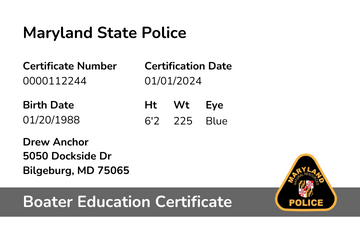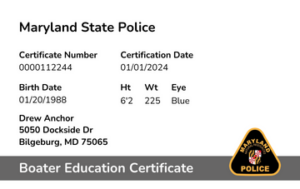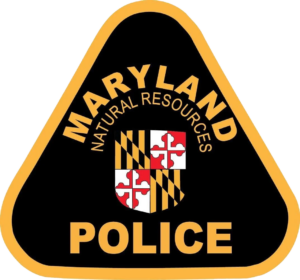
Maryland Boating License Guide
Discover all you need to know about obtaining your Maryland boating license, including age & operator requirements, vessel guidelines, and Maryland boating license regulations.
Key Takeaways
- You need a boating license if you were born on or after July 1, 1972, you must complete a boater safety course.
- To get a boating license, take a Maryland-approved boater safety course.
- Carry your boating license on board your vessel.
- The Maryland State Police administers the boater safety program.
How to get an Maryland Boating License
- Check to see if you need boater education and can legally operate a boat.
- Take a Maryland-approved boater safety course.
- Pass a final examination.
- Carry your certification onboard your boat.
Who Needs a Boating License in Maryland?
According to Maryland law, anyone born on or after July 1, 1972, must possess a certificate of boating safety education in order to operate any motorized vessel.
Even if you aren’t legally required to hold a boating license, the Maryland Department of Natural Resources stresses the value of boating safety education and encourages everyone to complete some type of formal boating safety training.
Exceptions to the boat license requirement
If the operator is from out of the country and operating a boat from out of the country and is not in the state of Maryland for more than 90 days;
If the operator is 16 years of age or older, is a resident of another state, visiting MD for 60 days or less, or in a vessel numbered in another state; or…
- If they hold a commercial vessel operator’s license issued by the U.S. Coast Guard
Who can operate a boat in Maryland?
The Maryland Department of Natural Resources urges all boaters to complete a boating safety course, regardless of requirement. However, a boating education course is only required for certain individuals. The laws dictating these specific rules are detailed below:
- Certificate Requirement: Anyone born on or after July 1, 1972, must have a Certificate of Boating Safety Education to operate any motorized vessel.
- Under 16 Supervision: Individuals under 16 years old can only operate a motorized vessel 11 feet or longer if supervised by someone at least 18 years old who holds a valid boating safety certificate or by someone born before July 1, 1972.
- Personal Watercraft: Individuals under 16 years old cannot operate a personal watercraft, even with a boating safety certificate.
For more information, visit the Maryland Department of Natural Resources Boating Safety page.
Take a Maryland-Approved Boater Safety Course
In Maryland, you can take NASBLA-approved boater safety courses to ensure you meet state and national boating safety standards. These courses are available online and in-person, offering flexibility to fit your schedule. They typically take about 3-8 hours to complete, depending on the format and provider. Online courses are convenient and self-paced, while in-person classes provide direct interaction with instructors. Upon successful completion, you’ll receive a boater education card, which is often required for operating certain watercraft. You can find these courses through organizations like Boat Ed, the U.S. Coast Guard Auxiliary, and the Maryland Department of Natural Resources (IDNR) website.
Online Courses Approved in Maryland
- www.BoaterExam.com ($34.95)
- www.Boat-Ed.com ($39.95)
- boattests101.com ($34.95)
- boatus.org ($20 donation)
Coming Soon 🤞We are working to get a Recademics Boater Safety Course approved in maryland.
In-person courses
The state offers live, in-person and instructor-led courses for free. These courses are volunteer lead and scheduled throughout the year.
In-person courses are a minimum of 8-hours of face-to-face instruction and skill demonstration in areas like boating safety, equipment and requirements, navigation, motorboat, registration, titling, emergency measures, and related Maryland boating laws and regulations.
At the end of the instructional segment, participants must pass a written test in order for the course to be considered complete.
While the class is intended to educate boat operators aged 12 and older, children who are 11 years old may take the course in anticipation of turning 12. However, they will not be allowed to sit for the course’s final exam or officially receive their certification until their 12th birthday. Review the Safety Education Class Schedule on the Department of Natural Resources website to find and register for a class.
Alternative in-person courses include options provided by the:
Pass the Final Boating Exam
At the end of your boater safety course, you will need to take and pass the boater safety test. By passing this test, you prove that you have at least the minimum knowledge regarding required equipment, safety contingencies, navigation, and how to respond in a variety of emergencies to keep yourself, your passengers, and other watergoers safe.
Generally, a score of 80% is considered passing. Many course providers will offer unlimited attempts, so if test-taking is something that makes you nervous, make sure you find a course vendor that provides this. Alternatively, you may use study guides and boater safety test preparation tools for your state to improve your chances of passing on one of your attempts.
Get Your Boating License!
Once you’ve finished the online course and passed the exam, you’ll want to keep the certificate or card you received in a safe place and carry it with you anytime you’re out on the water.
If you completed an online NASBLA-approved course, you will likely have the option to download and print a temporary Maryland Boater Safety Certificate. You can then expect your official Maryland Boater Safety Certificate, aka boating license, to arrive in the mail anywhere from a few days to a few weeks.
Why You Need a Boating License in Maryland
Legal Compliance
Depending on your age, you must have a boater education certificate in order to operate a boat on Maryland waterways. Certified boaters keep Maryland waterways safe. When you complete the requirements for earning a boating license in Maryland, you also demonstrate you’ve mastered the knowledge and operational skills to ensure that you safely operate a vessel safely.
Boater Education reduces accidents and fatalities
Maryland Boating License FAQs
Do I need to renew my Maryland Boating License?
No, you do not need to renew the Maryland boating license. It is good for life!
Is the Maryland Boating License good in other states?
Yes! The Maryland Boating License is recognized in all 50 states and Canada. This is known as reciprocity.
How do I replace a lost or stolen Maryland boating license?
If you lose your boating license or it is stolen, contact the course provider who issued your license. As a fallback, you can contact the Maryland Department of Natural Resources to obtain a new one. There may be replacement and processing fees.
How old do you have to be to get a Maryland boating license?
In Maryland, there is no minimum age requirement to take a boating safety course and obtain a boating safety education certificate. However, to legally operate a motorized vessel, individuals born on or after July 1, 1972, must have this certificate. It’s important to note that specific age-related restrictions apply to the operation of certain types of boats and personal watercraft (PWC). For example, operators of PWC must be at least 16 years old.
How long is the Maryland boating license valid for?
The Maryland boating license is good for life and does not need to be renewed. However, it’s a good idea to take a refresher course once in a while because laws change!
How much is a boating license in Maryland?
The cost to obtain a boating license online in Maryland ranges from $35 to $60.
What happens if I'm caught boating without my license in Maryland?
If you are caught boating without a required boating safety education certificate in Maryland, you could face several consequences. The Maryland Natural Resources Police may issue you a citation, which could result in fines and penalties. Additionally, operating a boat without the proper certification can lead to increased scrutiny and inspections of your vessel. Repeat offenses or serious violations may result in more severe penalties, including potential court appearances.
Sources & Citations
Maryland Department of Natural Resources. “Boating Safety Education & Certificate Requirements.” Accessed June 4, 2024. https://dnr.maryland.gov/boating/Pages/safety.aspx.
Maryland Department of Natural Resources. “Personal Watercraft Operation Requirements.” Accessed June 4, 2024. https://dnr.maryland.gov/boating/Pages/pwc.aspx.
Maryland Department of Natural Resources. “Boating Regulations.” Accessed June 4, 2024. https://dnr.maryland.gov/boating/Pages/regulations.aspx.




